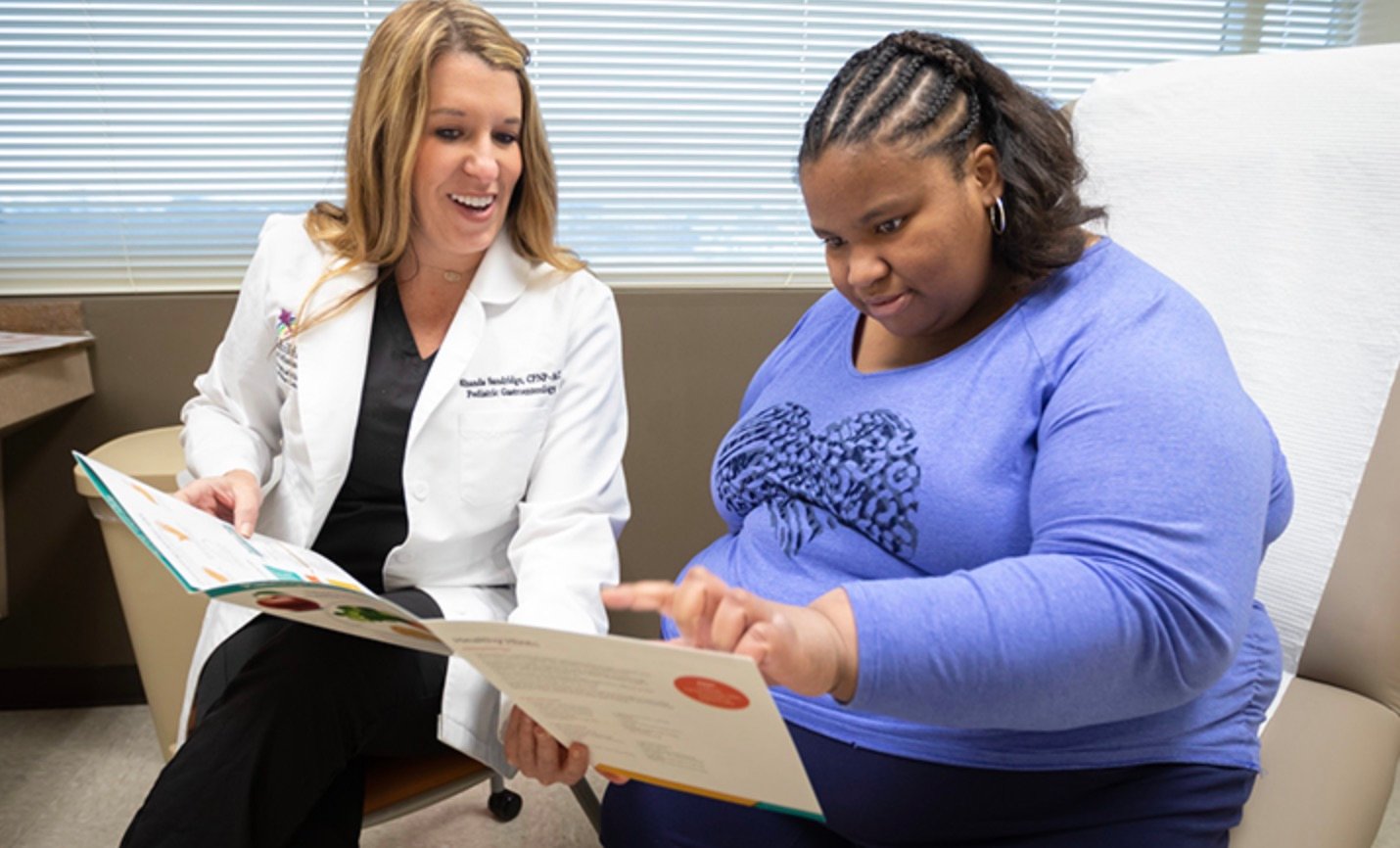UMMC offers individualized approach to managing weight
When Madison Central student Katelyn Greenlaw eats, her body doesn’t get the memo when she’s had enough.
A rare genetic disease, Prader-Willi Syndrome, keeps Katelyn from experiencing the sensation of fullness. “In her mind, even after she eats, she will say she is hungry,” said Talisha Greenlaw, mom of 19-year-old Katelyn.
Children and adults with Prader-Willi often cope with obesity. “You eat and eat and eat. We have to be mindful of that,” Talisha said. Mild to moderate intellectual and developmental disabilities Katelyn copes with also are common with the syndrome.
Katelyn, however, is learning how to manage her food intake and nutrition decisions thanks to her multidisciplinary care team at the University of Mississippi Medical Center’s weight management program. The Madison Central High student is currently bridging from pediatric to adult care, said Shanda Sandridge, her pediatric gastroenterology nurse practitioner.
“I tell patients that this is a three-pronged approach: the exercise part, the nutrition part and the pharmacological part,” said Dr. Tobe Momah, an assistant professor in the Department of Family Medicine who is board-certified in obesity medicine.
“The more we treat them collaboratively, the better the outcome.”
The weight management program offers a number of options at its spacious new clinic location at Riverchase Medical Suites in Flowood.
Adult medical, non-surgical weight management is led by Momah and Dr. Kimberly Bibb, also an assistant professor in the Department of Family Medicine and board-certified in obesity medicine.
The care team also includes registered dietitian Paul Robertson and Dr. Buren Smith, a clinical psychologist. The program also includes pharmacy services, meal replacement and supplements, and lifestyle and behavior therapy. Exercise therapy is provided at UMMC’s Wellness Center in Flowood.
Americans with a body mass index of 40 or greater are considered morbidly obese. Patients seen by Momah and Bibb, most between ages 40-50, have an average BMI of 50.3. A healthy weight for adults generally equates to a BMI of at least 19 but less than 25.
Adult bariatric surgery is led by Dr. Kenneth Vick, professor of general surgery. The care team includes Robertson, Smith, nurse practitioner Jennifer Godbold, and the nursing and support staff.
Candidates for bariatric surgery generally have a body mass index of at least 40, or 35 with co-morbidities such as cardiovascular disease or diabetes, said Adam Dungey, the Medical Center’s administrator of weight management services. Patients must complete an extensive screening process to receive medical clearance, which can include a sleep study, cardiovascular screens, a psychological evaluation and pre-surgery education, Dungey said. A surgical workup follows, and they receive comprehensive post-operative follow-up care for life.
Sandridge leads pediatric weight management, with collaborating providers including the entire adult weight management team and Dr. Naznin Dixit, professor of pediatric endocrinology.
The team also includes dietitian Krista King and Dr. Crystal Lim, a psychologist and a director in the Department of Psychiatry and Human Behavior. Patients receive lifestyle and behavior therapy, family education and meal supplementation.
“The great thing about it all is that patients are medically supervised,” Dungey said.
The weight management program is recognized as a Quality Comprehensive Center under the American College of Surgeons’ Metabolic and Bariatric Surgery Accreditation and Quality Improvement Program.
Patients often come to the program “as their very last straw,” Momah said.
Some patients immediately want bariatric surgery, even though they haven’t tried and failed to lose weight through diet and exercise. “We want them first to try to lose weight in a non-surgical manner. We don’t want surgery to be seen as the easy way out, because it’s not,” Dungey said.
Ongoing care from the entire team is critical to patients maintaining their weight loss, he said. “That and lifestyle changes are the most important factors,” he said. “If you don’t make the other changes, you won’t have success.”
When a pediatric patient still requires care as they approach adulthood, they’re transitioned to the adult team. And for some children, the weight loss journey can begin when they’re as young as 2, Sandridge said. “The most common ages we see are 8 to 12, but we do see a fair number of toddlers who are overweight and who already have comorbidities,” she said.
Exercise can be as simple as “just putting on music and dancing is a way to be active, and there are online videos,” Sandridge said. ‘We figure out what the child is interested in.”
Katelyn is learning to be mindful of everything she eats, including her carbohydrate intake, Greenlaw said.
The multidisciplinary approach to care is good for communication and convenience, Greenlaw said. “She has several doctors already, so it makes it a lot easier to see them all at one time,” she said. “Katelyn likes it because each of them knows her progress, and she has three people giving her praise as opposed to just one person.
“The bottom line is that weight management is comprehensive and collaborative care in all aspects.”
To find a weight management program that works for you, call 601-984-1285 or email weightmanagement@umc.edu



